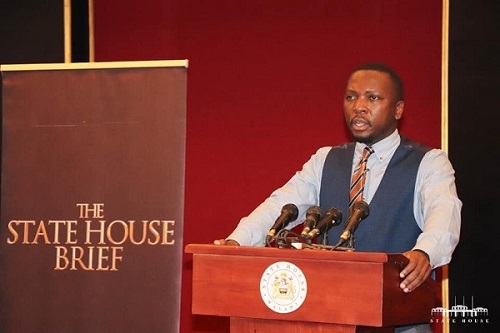Former Presidential Aide Sean Tsanzo Kampondeni, the once-powerful Special Executive Assistant and self-styled “Chief Strategist” to outgoing President Lazarus Chakwera, is facing a storm of public backlash after his poetic farewell message on Facebook backfired spectacularly.
Kampondeni’s lengthy post — written in his trademark polished English — was meant to be a graceful reflection on his five-year tenure at State House. Instead, it has triggered a fierce wave of anger and mockery from Malawians who accuse him of arrogance, detachment, and intellectual vanity that contributed to Chakwera’s humiliating electoral defeat.
Within hours of posting his statement, hundreds of users flooded his comment section with biting rebukes. Many described him as “a wordsmith who failed his own father-in-law,” blaming him for isolating Chakwera and shielding him from the realities ordinary Malawians faced.
“Sir, you wrote the beautiful speeches that made us believe in Chakwera,” wrote Wenji Sam Sulumba, one of the many disillusioned commenters. “You knew what Malawians expected from that office, yet you did nothing. You watched as the cries and insults poured in on social media. Why couldn’t you help the President change course?”
Another user, Emmanuel J. Kanchewa, offered what many saw as the one line missing from Kampondeni’s elegant prose:
“You should have written just one more sentence — an apology to Malawians for your role in this failure.”
Others were less forgiving. Iam Billy accused him of hypocrisy wrapped in eloquence:
“No matter how beautifully you write, you will never grasp the pain your leadership caused. You lived comfortably while Malawians suffered.”
Blessings Jimmy Masina went further, calling the Chakwera administration “the worst performance ever to happen to Malawi,” while Phyllis Wa UTM unleashed a scathing rebuke in Chichewa, later translated by one follower as:
“You proud people have ruined this country. You thought you were untouchable — always writing long speeches to destroy instead of build. God has exposed you. I am happy to see your downfall.”
As the criticism intensified, Kampondeni — known during his tenure for disabling comments on Chakwera’s official Facebook posts to control public outrage — quietly locked the comments on his own farewell post, a move that only fueled further outrage.
For many Malawians, Kampondeni became the symbol of everything wrong with Chakwera’s leadership — aloof, insulated, and overly enamored with rhetoric rather than results. His fluency, once celebrated, is now seen as the gilded shell that covered a hollow presidency.
“Sean’s English never fed a hungry child,” remarked one user. “He spoke as if he were addressing angels, not citizens.”
Kampondeni’s fall from grace is as dramatic as his rise. Once regarded as the intellectual engine of the presidency, he now stands accused of helping steer the ship of state into an iceberg — with his words, not his wisdom.
In the court of public opinion, the verdict is clear: Sean Kampondeni may have mastered the language of leadership, but not the substance of it.













